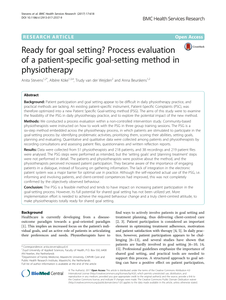Objective: A key aspect of psychiatric rehabilitation is supporting individuals with serious mental illness in reaching personal goals. This study aimed to investigate whether various aspects of the working alliance predict successful goal attainment and whether goal attainment improves subjective quality of life, independent of the ehabilitation approach used. Methods: Secondary analyses were conducted of data from a Dutch randomized clinical trial on goal attainment by individuals supported with the Boston University approach to psychiatric rehabilitation (N=80) or a generic approach (N=76). Working alliance was measured with the Working Alliance Inventory (WAI) from the practitioner’s perspective. Rehabilitation practitioners had backgrounds in social work, nursing, or vocational rehabilitation. Multiple logistic regression and multiple regression analyses explored effects of working alliance on goal attainment and of goal attainment on subjective quality of life at 24 months. Analyses were controlled for client- and process-related predictors, baseline quality of life, and rehabilitation approach. Results: The WAI goal subscale predicted goal attainment at 24 months. No effect was found for the bond or task subscale. Goal attainment significantly predicted quality of life at 24 months. These effects were independent of the rehabilitation approach used. Conclusions: A good bond between client and practitioner is not enough to attain successful rehabilitation outcomes. Findings suggest that it is important to discuss clients’ wishes and ambitions and form an agreement on goals. Attaining rehabilitation goals directly influenced the subjective quality of life of individuals with serious mental illness, which underscores the importance of investing in these forms of client support.
MULTIFILE

Background: Patient participation and goal setting appear to be difficult in daily physiotherapy practice, and practical methods are lacking. An existing patient-specific instrument, Patient-Specific Complaints (PSC), was therefore optimized into a new Patient Specific Goal-setting method (PSG). The aims of this study were to examine the feasibility of the PSG in daily physiotherapy practice, and to explore the potential impact of the new method. Methods: We conducted a process evaluation within a non-controlled intervention study. Community-based physiotherapists were instructed on how to work with the PSG in three group training sessions. The PSG is a six-step method embedded across the physiotherapy process, in which patients are stimulated to participate in the goal-setting process by: identifying problematic activities, prioritizing them, scoring their abilities, setting goals, planning and evaluating. Quantitative and qualitative data were collected among patients and physiotherapists by recording consultations and assessing patient files, questionnaires and written reflection reports. Results: Data were collected from 51 physiotherapists and 218 patients, and 38 recordings and 219 patient files were analysed. The PSG steps were performed as intended, but the ‘setting goals’ and ‘planning treatment’ steps were not performed in detail. The patients and physiotherapists were positive about the method, and the physiotherapists perceived increased patient participation. They became aware of the importance of engaging patients in a dialogue, instead of focusing on gathering information. The lack of integration in the electronic patient system was a major barrier for optimal use in practice. Although the self-reported actual use of the PSG, i.e. informing and involving patients, and client-centred competences had improved, this was not completely confirmed by the objectively observed behaviour. Conclusion: The PSG is a feasible method and tends to have impact on increasing patient participation in the goal-setting process. However, its full potential for shared goal setting has not been utilized yet. More implementation effort is needed to achieve the required behaviour change and a truly client-centred attitude, to make physiotherapists totally ready for shared goal setting.
DOCUMENT

Objective: A key aspect of psychiatric rehabilitation is supporting individuals with serious mental illness in reaching personal goals. This study aimed to investigate whether various aspects of the working alliance predict successful goal attainment and whether goal attainment improves subjective quality of life, independent of the rehabilitation approach used. Methods: Secondary analyses were conducted of data from a Dutch randomized clinical trial on goal attainment by individuals supported with the Boston University approach to psychiatric rehabilitation (N=80) or a generic approach (N=76). Working alliance was measured with the Working Alliance Inventory (WAI) from the practitioner’s perspective. Rehabilitation practitioners had backgrounds in social work, nursing, or vocational rehabilitation. Multiple logistic regression and multiple regression analyses explored effects of working alliance on goal attainment and of goal attainment on subjective quality of life at 24 months. Analyses were controlled for client- and process-related predictors, baseline quality of life, and rehabilitation approach. Results: The WAI goal subscale predicted goal attainment at 24 months. No effect was found for the bond or task subscale. Goal attainment significantly predicted quality of life at 24 months. These effects were independent of the rehabilitation approach used. Conclusions: A good bond between client and practitioner is not enough to attain successful rehabilitation outcomes.Findings suggest that it is important to discuss clients’ wishes and ambitions and form an agreement on goals. Attaining rehabilitation goals directly influenced the subjective quality of life of individuals with serious mental illness, which underscores the importance of investing in these forms of client support.
LINK